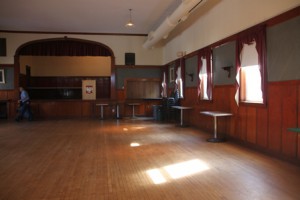By Alex Cornacchia, Contributing Writer

Grafton – There’s something about the tables – long, banquet-style, with chicken soup and turkey and (if the hosts were good) a bottle of whiskey in the middle. The tables seem to have worked their way into people’s collective memory of the Polish National Home (PNH) in South Grafton, an unforgettable presence in the Polish wedding celebrations held in the second story hall. Perhaps it’s because of the disappearing act they had to perform by the end of dinner. Broken down, swept aside, pressed up against the wall — they could be anywhere but the center of the floor. With wax scattered and the band prepared, it was time to dance. The polka and the “Oberek” of course.
Though it may not be obvious today, there was a time when the Polish population in South Grafton was booming. The mills that were there in the early 1900s had made a promise: steady work and good pay. To immigrants from countries where neither of those things were a given, South Grafton didn’t just seem like a pretty good place to settle — it sounded a lot like living the dream.
But working day in and day out starts to wear on anyone, especially when it’s the hard and tedious stuff of mill labor. South Grafton’s Polish immigrants longed for a place to gather and celebrate occasions, or even to simply relax. At a meeting Nov. 24, 1929, the first tentative idea for a Polish home was proposed. Six years later, it became a reality.
As one might expect of any endeavor involving money undertaken during the Great Depression, the process of getting there wasn’t easy. When funds ran out after building only the first of two stories, the Polish National Home Association (PNHA) held fundraisers and sold drinks at the bar on the one floor they did have until there was enough money to build a second. When expenses started to rack up again, they formed a committee that literally went from door to door asking for interest-free loans. People who offered their labor in the construction of the home were given a shot of liquor at the end of the day in lieu of cash.
Somehow, they made it work, even managing to get a crystal light in the upstairs hall. As Joe Kuras, who was involved with the PNH in some capacity (as PNHA president, bartender, snow-shoveler) for 25 years, explained: “People were not rich, but they were generous.”
Economic burdens be damned, the Polish National Home opened its doors on Sept. 8, 1935, with a grand celebration. It was the first of many to come.
In the early years, the upstairs hall — with its stage, spacious wooden floor, and balcony — was home to concerts, dances, political rallies and wedding receptions.
“I always thought everyone in the whole wide world had their wedding reception at the Polish Home,” Kuras recalled.
The downstairs bar became a local favorite, too. Men would walk over from the mills when their shifts ended, enjoying a few drinks or playing a round of pool. Women wouldn’t get a seat at the bar until around World War II; it wasn’t an explicit rule, it just wasn’t considered proper. Instead, they used a separate entrance to get to the kitchen, where they cooked meals for the men. Though women are allowed in the bar today, one quirk in the layout remains: if they want to use the ladies’ room, they have to walk through the kitchen first.
The war years brought a slump, but when the war ended, a group that called themselves the Younger-Set proposed weekly dances for the youth of South Grafton. They were a hit from the start. From big band and swing to sock hops and rock and roll, those dances were a staple, first for the young people in South Grafton, and then, when a popular teen club in Grafton shut down, for any young person in Grafton who wanted to attend.
As the years went by, though, membership at the home started to dwindle.
“Each generation is more of a melting pot,” Kuras remarked.
Younger generations, not as in touch with their Polish roots, went off in search of newer places to spend their days and evenings. Even the members and associate members who do remain are not all of Polish descent.
“Not Polish, not Polish, Polish, not Polish.” Peter Wojnar, PNHA’s current president, pointed down the line of men sitting at the bar on a recent Thursday afternoon.
But not every tradition has been lost. PNHA still hosts a polka dance every October. Wojnar’s father had his wedding reception at the home in 1956; his son, nearly 60 years later, will likely have his there in November. And the current members are always quick to clarify a point that’s important to them, trying to ensure the name PNH’s founders chose remains constant: it’s not the Polish Club, it’s the Polish Home.

















